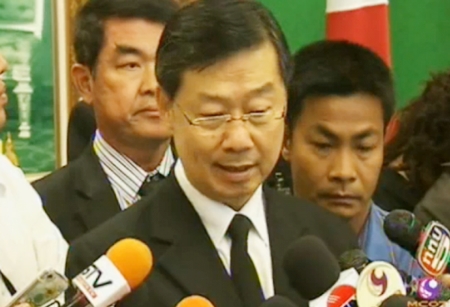BANGKOK, Nov 5 – Thailand’s Deputy Senate Speaker affirmed today that the Senate will take into account public interest, the rule of law and national stability when the upper house deliberates the controversial amnesty bill next week.
Deputy Senate Speaker Surachai Liengboonlertchai reacted shortly after Prime Minister Yingluck Shinawatra appeared on national television urging the Senate to exercise discretion in deliberating the bill which has drawn widespread protest from the public and business communities in the capital and provinces.

“The Senate will consider the amnesty bill thoroughly with public opinion being heeded,” Mr Surachai pledged. “The decision will be based on rightness and the rule of law as well as the public interest and national stability.”
“Be assured that the Senate will work independently,” he stated, adding that he hoped the upper house will help ease the tension in the country.
In her national televised address, Ms Yingluck urged the upper house to exercise full discretion in its deliberation of the bill based on national reconciliation and mercy.
“No matter what the decision will be, be it rejection or (changing by) amendment, I believe that the lawmakers who voted in favour of the bill will accept the (senate) decision for the sake of national reconciliation,” Ms Yingluck said.
The premier’s statement came a few days after anti-amnesty bill mass protests led by the opposition Democrat Party drawing tens of thousands of people onto Bangkok streets.
Opponents of the bill are angered that its passage will clear ousted prime minister Thaksin Shinawatra of legal liability for his wrongdoings and pave the way for his return to Thailand. Some Red Shirt supporters also voiced their frustration against the bill, reasoning that the authorities behind the 2010 deaths during the Red Shirt protests, including Democrat party leader and former prime minister Abhisit Vejjajiva and his deputy Suthep Thaugsuban, will also be pardoned.
The premier said her government wants to restore national reconciliation and urged all parties to refrain from any actions which could lead to further conflict
“Forgiveness will help reduce conflict and allow the country to move on,” Ms Yingluck said, noting that many groups are not willing to forgive and violence is likely to continue. The premier said she does not want to see the amnesty bill distorted and become a tool in political conflict.
If the upper house rejects the bill, it will be sent back to the House of Representatives which would leave it for 180 days before reconsidering it. However, the lower house can pass the bill and forward it for royal endorsement.




